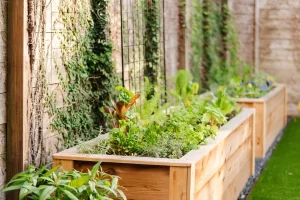Going organic may take more effort, but the effort will certainly pay off in healthier fruits and vegetables and contributing to making our world better.
Weeding and mulching are integral elements of an organic garden, helping avoid herbicides that harm soil ecology and can leach into food products we consume.
1. It’s Good for the Environment
As soon as your own organic vegetables come up from the ground, fresh food is available right at your fingertips – without having to travel across country and store in a warehouse before reaching you – which means less loss in terms of nutrition and flavor during transit.
Your garden should also avoid using synthetic chemicals that could contaminate nearby woodlands and waterways, providing crucial protection for wildlife such as birds, insects and small creatures that depend on clean water sources for survival. This means protecting wildlife such as birds, insects and small creatures which require clean environments for survival – including birds, insects and amphibians that need clean environments in which to nestle down for the night.
Organic gardening encourages you to choose seeds and saplings that best suit the climate, soil type and moisture conditions in your area, which helps minimize invasive species that threaten ecosystem health and other plants. Furthermore, mulches, sheeting or other organic methods of weed management such as sheeting are more sustainable solutions than herbicide spraying.
2. It’s Good for Your Health
Gardening without chemical fertilizers or pesticides will yield healthy fruits and vegetables that you know were grown using safe methods and are completely edible.
Organic gardening typically utilizes natural methods for pest control, and planting crops that replenish the soil nutrients. Crop rotation also serves to disrupt soil-borne pests by moving plant types around in your garden every year and disrupting their lifecycle.
Bokashi One Compost Mix can help naturally enrich the soil of your garden, saving money on chemical fertilizers while decreasing waste and landfill space requirements. In addition, this allows you to become more self-reliant by cutting food miles – something both the environment and your health will appreciate!
3. It’s Good for the Economy
Organic food has long been associated with treehuggers and old hippies; now more people than ever are turning towards growing their own organic gardens as an avenue to fresh, flavorful produce that’s healthier than what can be found at traditional supermarkets.
Organic gardening also reduces chemical pesticide, herbicide, and fungicide runoff that pollutes water supplies while killing insects and small animals. Furthermore, it helps reduce soil erosion while improving ecology by adding organic material to the soil.
Organic matter adds organic material to soil that improves its structure, allows for better moisture retention and increases its nutrient content, as well as making plants more resistant to disease and other issues. Regular soil tests with Dynamic Lifter Organic Lawn Food products such as these ensure healthy plants with vibrant produce.
4. It’s Good for Your Budget
Organic gardens avoid synthetic fertilizers and pesticides that are costly and sometimes toxic, opting for natural materials like compost and manure instead to enrich their soil.
An organic garden relies on healthy soil to promote plant health and resilience. A soil test and any needed amendments ensure the environment supports growth of both flowers and vegetables alike.
Mulching helps conserve soil moisture, suppress weeds and regulate soil temperature while watering roots rather than foliage promotes deeper root systems. If possible, avoid using too hot or too cold of water and water your crops early morning for maximum evaporation and disease/fungus prevention resulting from damp leaves.
5. It’s Good for the Wildlife
Organic gardening offers many environmental and health advantages; no harmful synthetic pesticides and fertilizers need be used, leaving only beneficial residues on crops. Plus it’s a fantastic way to get some exercise while enjoying nature!
Organic soil is rich with life, providing food and shelter for small creatures and insects alike. By planting native species in it, you can help build a habitat for local wildlife to flourish in.
An essential step to organic gardening success is prepping the soil. A soil test can give you important information on its pH level and nutrient content; once this information has been obtained, natural soil enrichment products like Dynamic Lifter may help boost these levels further allowing your plants to flourish at their maximum!




